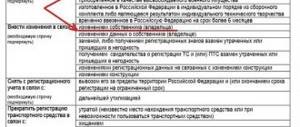The process of selling a vehicle has now been significantly simplified; now the seller does not need to personally control the execution and submission of documents to the MREO. He only signs the purchase and sale agreement, after which the buyer is given the right to contact any selected traffic police department within 10 days to re-register the car. But they do not always do this within the prescribed period, guided by their reluctance to pay taxes or fines. Then the question arises, what should the seller do if the buyer does not register the car after purchase? Let's try to understand it in more detail.
Vehicle registration rules
Re-registration of a vehicle seems to many to be a complicated procedure, so they are in no hurry to make an appointment at the nearest branch, postponing everything until later. As a result, this leads to violation of the deadlines established by law. It itself is not complicated and is performed according to the following algorithm:
- Collection and verification of documents. To contact the territorial authority, you will need a passport of a citizen of the Russian Federation, a vehicle certificate, a diagnostic card and a PTS.
- Registration of an insurance policy for the buyer. This is done in any chosen company at personal discretion.
- Payment of state duty. This can be done on the official Gosuslugi portal, which allows you to additionally receive a discount, or at the bank’s cash desk.
- Submitting an application. It is drawn up on a special form and filled out in person. All documents are attached to it.
- Checking the car. The specialist checks the data in the vehicle title with the actual data; for this purpose, the vehicle is inspected at a special site. The procedure takes about 10 minutes. If there is illegal tuning or tinting, it is better to remove them before checking, as this will be the reason for refusal to re-register.
- Obtaining a new certificate. If license plates have been changed, they will be issued at this stage. It is important to check the correct spelling of the last name and all entered data.
It is important to know! If, after selling the car, the new owner does not register the car, he bears administrative liability in the form of a fine. Today it is 1500 rubles. Driving a vehicle that is not registered in accordance with the established procedure implies a sanction of 5,000 rubles.
What to do if the new owner does not register the car
Not all sellers who have encountered unscrupulous people know what to do if the buyer does not register the car. At the same time, such actions can significantly complicate life, because no one wants to pay taxes on equipment that another person has been using for a long time. In addition, no one is immune from problems with the police if the vehicle was seen in an accident. Procedure in such a situation:
- Contact the traffic police to obtain confirmation of vehicle registration to the previous owner.
- Try to find a buyer and convince him to register the vehicle in the prescribed manner.
- If contact with him is lost or he ignores the request, put the car on the wanted list or deregister it.
- Fill out an application to the MREO, providing confirmation of the concluded transaction with the second party. It is advisable to attach the acceptance certificate.
It should be understood that if the car was sold “by proxy,” then the owner does not change, and all notifications will be sent to the old address. Current legislation does not provide for this method of selling a car, so in fact this is not considered a transaction. The issued document, even certified by a notary, only allows you to use the vehicle, but not to perform any actions with it. Responsibility for it remains with the previous owner.
What to do if the new owner does not register the car
Despite the fact that the previous owner is not obliged to deregister the car, after 10-15 days check whether the new owner has re-registered it according to the traffic police information. You can do this by going to the official website of the traffic police. Select the “Services” and “Car Check” tab.
In the first column, enter the VIN of the car and check the registration information. The buyer is required to register the car within 10 days after purchase. If everything goes smoothly, the latest data on the date of re-registration to the new owner will be displayed.
If, after selling the car, the new owner does not register it, then there are several options for action.
Call the new owner, ask what the cause of the problem is and ask to resolve the issue. Perhaps the person was simply sick, or was going on vacation, or in his city there is no free appointment to register a car and it doesn’t fit in on time. Yes, this also happens. If a person is adequate, everything will be settled.
It happens that after a purchase, problems arise with emerging encumbrances on the car, in which case the seller will be to blame. The buyer has the right to terminate the contract and receive the money back. In this situation, a joint visit to the MREO is the best option.
If the new owner of the car feeds you breakfast, moves it and puts it aside without registering the car, threaten with breaking the contract or writing off the vehicle for scrap. A decisive attitude will give acceleration to a forgetful latecomer. We do not recommend frightening the client by filing a complaint about theft, since after presenting the CP agreement, slander will be revealed and you will have to answer to the authorities.
Let's consider the simplest and most effective way of what to do if the new owner does not register the car.
Contact the nearest traffic police department with a contract for the sale of the car and an application to deregister the vehicle. An employee will accept and process the application. After this, the registration record for this car is canceled and the license plates are put on the wanted list. The procedure is free of charge and no fees are charged.
The first check of documents for the car and the new owner will mean a fine and confiscation of license plates. Another disadvantage for the buyer is that upon registration you will have to pay for the issuance of a new license plate, since the old one is canceled when deregistered by the previous owner.
Particularly touchy sellers may even write off the car as scrap. Then the new owner will face difficulties with registering the car; restoration of registration will only be possible through the court, and there is no 100% guarantee that the court will cooperate.
If the sales contract is lost
Having sold a car, most do not think about checking its re-registration, especially if neither fines nor other troubles bother them and have not encountered troubles before. But it happens that you receive a vehicle tax or a fine, but you have lost the car purchase agreement.
In this case, we write an application to deregister the car due to loss. It is this wording that will allow you to get rid of the registration of a vehicle that does not belong to you in the traffic police and in the future the buyer will be able to register the car without any problems.
Good luck on the roads!
What actions should not be taken?
After a sale under a purchase and sale agreement, even if it is not registered, you should not take rash actions that will lead to more serious consequences in the future. First of all, you should not do the following:
- Ignoring receipts. The obligation to pay fines and taxes rests with the owner until the buyer re-registers the vehicle in his name. If they arrive by mistake, then you should take a certificate from the traffic police about deregistration of the car, or re-registration, and personally take it to the tax office. In other cases, they will need to be paid.
- Deregister a car due to disposal. The new owner will need to go to court if the former owner files an application. But even in this case, there is a risk that the decision will be negative.
- Report theft. Such information is untrue and therefore illegal. The caught buyer after search activities will incur criminal liability, although the misdemeanor is punishable only by a fine. And if he presents a sales contract, the seller will be punished.
It is important to know! If the car is sold, but the new owner has not registered it, and the tax has arrived, it is worth paying it on time. Subsequently, the amount can be recovered from the buyer, voluntarily or judicially.
What to do if, after selling a car, the new owner does not register it
Based on the norms of the current legislation of the Russian Federation, a citizen who purchased a vehicle from you must register it with the traffic police authorities within 10 days, thereby notifying them of the fact of the transfer of ownership of this vehicle from the previous owner to him.
In the event that this legal norm is violated, the parties to the car purchase and sale transaction may face the following consequences:
- The previous owner will receive documents about the imposition of various fines on him, as well as notifications about the need to pay transport tax. This situation is explained by the fact that for government agencies it is he who is the owner until the new owner registers the car;
- A citizen who bought a car from you and violated the deadline for registering it may be forced to replenish the state treasury. Penalties will be imposed on him for using a vehicle for which the documents are not properly prepared;
- If the new owner of the car systematically ignores the legal requirements of the traffic police officers regarding the proper execution of all documents for the car and its registration, then it may be taken to a impound lot;
- In addition, if the new owner continues to ignore the requirements to register the car he purchased, then he may be subject to a fairly large fine, and he may also be deprived of the right to drive a vehicle for a fairly long period of time;
- As a last resort, there is the possibility of unilateral cancellation of the purchase and sale agreement on the basis of which the car was purchased. In this case, the funds received for it are not returned.
Steps to resolve the problem
When 10 days have passed since the signing of the vehicle purchase and sale agreement, and its new owner has not completed the re-registration procedure, in order to protect his interests, it is advisable for you to take one of the following steps:
- Notify the new owner that, in accordance with the current legislation of the Russian Federation, he is responsible for driving a car for which he has not properly prepared the documents;
- Send a request to the traffic police to determine whether the new owner of your vehicle has properly registered it;
- Notify the traffic police that you sold the vehicle, and the citizen who purchased it has not yet properly registered it;
- If all these efforts have not led to the registration of the car purchased from you, you can initiate termination of the purchase and sale agreement. But in this case, you will have to return the money to the failed buyer.
It is worth emphasizing that if you initiate termination of the car purchase and sale agreement, then you have the right to demand that the citizen who originally purchased the car from you pay a penalty.
But to do this, you need to provide for this possibility in the text of the contract. In addition, it is advisable to clearly indicate in the contract within what time frame the new owner is obliged to carry out the procedure for registering the car with the traffic police.
By tracking whether the car re-registration procedure was carried out, you can avoid many unpleasant situations associated with the need to pay taxes and fines.
Note that the new owner, in the event of a systematic refusal to register the car, should be prepared to pay large fines.
Return of the car under the purchase and sale agreement. How to check a car for cleanliness before buying, read here.
Find out how to get your money back for buying a car using this link:
Let us note that sometimes the new owner wants to register the car he purchased in full compliance with the current legislation of the Russian Federation, but cannot do this due to the fact that encumbrances have been placed on the car.
A citizen who finds himself in such a situation should contact the traffic police to officially record this situation.
Indeed, in this case, a violation of the law was committed by a citizen who sold a vehicle, despite the encumbrance imposed on it.
A citizen who has purchased such a car is completely exempt from liability for failure to register it within the time limits established by law.
In addition, the new owner has the opportunity to terminate the purchase and sale agreement and receive back the funds paid to the seller. In this case, the car must be returned to the seller.
The basis for such termination of the contract will be the fact that the vehicle was sold in violation of the norms established by law.
In order to avoid problems caused by failure to register a car within the time limits established by law, it is better to carry out the re-registration procedure jointly between the seller and the buyer.
When do fines and taxes arrive on a sold car?
What to do if the car buyer does not register the car after 10 days? First of all, pay all taxes and fines that came to the name of the owner, otherwise a penalty will be charged and available compulsory collection measures will be used. What additional actions should be taken:
- Find the person who purchased the vehicle and demand that it be registered in the prescribed manner.
- Contact the MREO with an application to deregister the car. The procedure and rules will be explained by a specialist on site.
- Terminate the contract unilaterally. This can be done only through the court, with the provision of justification for their claims.
Advice! The most optimal way to resolve the issue is considered to be a peaceful way, but this does not always work out that way. Therefore, a radical measure is the disposal of the vehicle; in this case, the buyer will not be able to operate the car and will be forced to get rid of it by selling it for scrap or spare parts.
Car registration is a problem for the seller
Drawing up a vehicle purchase and sale agreement is only part of the necessary formal procedures when carrying out a transaction. In fact, this document only grants the right to use the car to the new owner. Formally, the car will still belong to the seller until the buyer re-registers it in his name with the traffic police.
IMPORTANT! According to the order of the Ministry of Internal Affairs of Russia No. 399 dated June 26, 2018, the new owner is required to register the purchased car with the traffic police within 10 days from the date of signing the purchase and sale agreement.
However, in practice, the buyer is not always in a hurry to comply with this rule, ignoring the trip to the traffic police and continuing to drive the car without registering it in his name.
In this case, a problem arises for the former owner, whose name continues to receive transport tax and fines for violations that he did not commit.
Buyer's liability for violation of law
A buyer who violates the statutory deadline of 10 days and applies for registration later is required to pay a fine of 1,500 rubles. Administrative liability for legal entities is more severe and amounts to 10,000 rubles. But in addition to this sanction, you will additionally need to pay 500 rubles if a traffic police officer stops a new owner in such a car. For a repeated violation, namely the operation of a vehicle that is not legally registered, a fine of 5,000 rubles or deprivation of rights is implied.
If you sold a car under a sales contract, but the new owner does not register it, you should take action. Otherwise, all fines and tax assessments will be sent to the address of the current owner, and he undertakes to pay them on time. The best option is to contact the State Traffic Inspectorate with an application for deregistration. What you shouldn’t do is ignore payments and submit a request for disposal of the vehicle, which will lead to serious troubles later.









